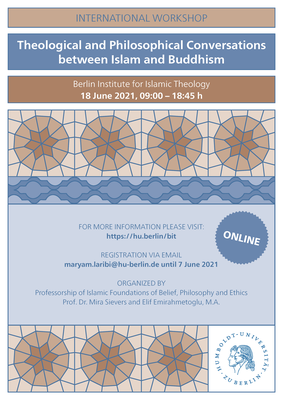Invitation
Although interreligious dialogue and comparative studies between various religious traditions have been well established over several decades, theological and philosophical conversations between Islam and Buddhism are still in the early stages. The encounter between Muslims and Buddhists has been often overshadowed by misunderstandings, negative images and biases, what also partly explains the lack of interest in theological dialogue between the two religions. From the viewpoint of Islamic theology, Buddhism is predominantly conceived as atheism due to the absence of the concept of a creator God or regarded as idolatry in which the decorated buddha statues are worshipped; whereas the Islamic notion of God as an omniscient and omnipotent creator is commonly seen as an unbridgeable gap on the side of Buddhism. The Buddhist concepts of anātman (non-self) and śūnyatā (emptiness), the theory of rebirth, the Islamic doctrine of prophethood constitute further fundamental differences that are regarded as irreconcilable by members of these religions. In this field of tension, the planned workshop aims to contribute to that underdeveloped branch of comparative studies. It will thus bring three central tenets of Islam and Buddhism into a comparative conversation, giving also room to academic insider perspectives.
The workshop will investigate three themes—i.e. the concept of God/reality, the nature of human existence and the transformation of self through religious practice—from Islamic and Buddhist perspectives respectively. Within the scope of the workshop, the issues in question will be discussed by both Muslim and Buddhist scholars and experts on Islamic and Buddhist philosophies. It is thereby aimed to find similarities in theological and philosophical teachings of these traditions regarding the conceptions of reality and human beings, despite the well-known differences in certain respects. To draw attention to similarities in the doctrines of Islam and Buddhism might provide furthermore a fruitful common ground for reciprocal appreciation and give both traditions an opportunity to reinterpret the practices and beliefs of their own religion in the light of a new perspective.
Workshop Programme
09:00 – 10:30 Opening: Bringing Buddhist and Islamic Traditions into a Conversation
09:00 – 09:20 Welcome Speech, Prof. Dr. Mira Sievers
09:20 – 10:00 Keynote Lecture, Prof. Dr. Perry Schmidt-Leukel
“… that you may come to know one another” (Qur’an 49:13).
Learning about, from, and with the religious other.
10:00 – 10:30 Discussion
10:30 – 11:00 Coffee Break
11:00 – 12:45 First Session: The Concept of God / Reality
Chair: Prof. Dr. Mohammad Gharaibeh
11:00 – 11:30 An Islamic Theological Perspective, Dr. Farid Suleiman
11:30 – 12:00 A Buddhist Theological Perspective, Dr. Alexander Berzin/Dr. Fabian Völker
12:00 – 12:20 Responses by the two speakers
12:20 – 12:45 General Discussion
12:45 – 14:00 Lunch Break
14:00 – 15:45 Second Session: The Nature of Human Existence
Chair: Dr. Claudia Seise/Dr. Ayşe Almıla Akca
14:00 – 14:30 An Islamic Philosophical Perspective, Dr. Ufuk Topkara
14:30 – 15:00 A Buddhist Philosophical Perspective, Prof. Dr. Peter Harvey
15:00 – 15:20 Responses by the two speakers
15:20 – 15:45 General Discussion
15:45 – 16:15 Coffee Break
16:15– 18:00 Third Session: Transformation of Self through Religious Practice
Chair: Prof. Dr. Tuba Isik
16:15 – 16:45 An Islamic Theological Perspective, Elif Emirahmetoglu, M.A.
16:45 – 17:15 A Buddhist Theological Perspective, Dr. Carola Roloff
17:15 – 17:35 Responses by the two speakers
17:35 – 18:00 General Discussion
18:00 – 18:15 Coffee Break
18:15 – 18:45 Concluding Reflection
Prof. Dr. Andreas Feldtkeller
The List of Speakers
Dr. Alexander Berzin, Independent Scholar (PhD at Harvard University)/Dr. Fabian Völker
Elif Emirahmetoglu, M.A., Humboldt University of Berlin
Prof. Dr. Andreas Feldtkeller, Humboldt University of Berlin
Prof. Dr. Peter Harvey, University of Sunderland (Emeritus)
Dr. Carola Roloff, University of Hamburg (Permanent Visiting Professor)
Prof. Dr. Perry Schmidt-Leukel, University of Münster
Prof. Dr. Mira Sievers, Humboldt University of Berlin
Dr. Farid Suleiman, FAU Erlangen-Nürnberg
Dr. Ufuk Topkara, Humboldt University of Berlin
Organized by
Professorship of Islamic Foundations of Belief, Philosophy and Ethics
Prof. Dr. Mira Sievers
Elif Emirahmetoglu, M.A.
Location
Hybrid event
For online participation see below
Registration
Registration is required.
Please contact maryam.laribi@hu-berlin.de
until 15 June 2021
Contact
Maryam Laribi
Berlin Institute for Islamic Theology
Humboldt University of Berlin


